Rebellion of Julius Caesar: Democrat Becomes Emperor
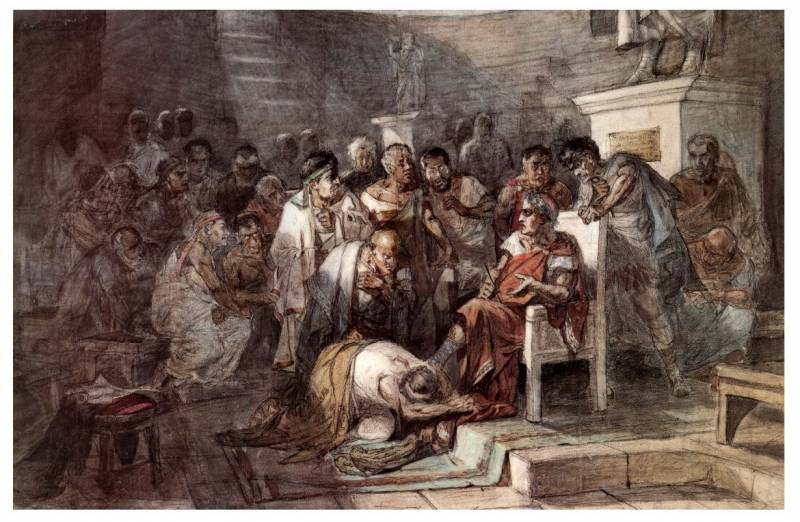
Death of Caesar. Hood. V. S. Surikov, State Russian Museum. Saint Petersburg.
O times! About manners!
In two previous articles on the first Roman rebellions, we wrote that this phenomenon clearly fits into historical processes in ancient Rome. Rebellion as an uprising of the army cannot occur at any time, but is associated with a certain period in the development of ancient Roman society.
And it arises only when the army becomes professional and loses contact with society, ceases to be popular. Because the people's army is not when someone from the people serves in it, because someone from the people always serves in the army, where else can you find soldiers? And then, when the army ceases to be a people's militia.
In military-technical terms, the ancient Roman army of the people's militia was a highly organized mechanism that achieved tremendous success in the fight against enemies and the seizure of foreign territories, but it cannot be compared with the training and military-technical capabilities of a professional army. Because the militia was engaged in military training from time to time, and the professional army lived only on this.
The militia fights out of necessity, and war for professionals is the essence of their existence. The professional army has interests that could conflict with the interests of society, although they could coincide, more on that.
And only a military dictatorship could ensure these goals.
Thus, firstly, in order for the interests of military people to be a priority for society, it is necessary to establish power over it by armed means.
Secondly, in Rome, torn apart by clashes between different social groups, the dictatorship became a mechanism of governance that historically corresponded to the development of society, but many people suffered from it during its formation. From terror during the establishment of military power and during the subsequent civil war in Rome, a huge number of supporters of the republican form of government, in its various interpretations, died, as well as random people.
The historical path of development of Roman society along the paths of expansion, the development of a primitive agrarian society solely due to external conquests, would have been impossible without a new system of governance and the destruction of obsolete and incompetent republican systems.
The further existence of the Roman state went exclusively along the paths of expansion and conquest. And as usual, interrelated things in history: in order to continue to exist, the Roman society needed war and aggression. To ensure society, the main tool for this was necessary - the army. And the army was professional, since the people's militia could not cope with such a task, and could not exist in the new economic conditions of the ruin of a small peasant economy.
The exploitation of the occupied lands and provinces ensured the existence of the center. And intermittent military mutinies during the imperial period redistributed resources from one group that seized power to another. At the same time, part of the resources was allocated from time to time to the most disadvantaged. This situation continued until external pressure on the Roman state began to prevail.
Although the dictators, paving the way to personal power, tried to revive the republican forms of government, but in fact it was not a return to past forms, but the creation of completely new institutions.
And if some institution of the past, like the Senate, continued to exist both in Rome and in the Roman Empire, this does not mean that it was the same as in earlier times of the republic: the Senate gradually turned into a decorative body in which nothing was decided. The same thing happened with other bodies of republican government, for example, consuls, who existed in Byzantium until the XNUMXth century, but did not have any power.
Because the governing bodies have moved to the military camp of the one who has the “impory” and “potest” to support this management.
Describing the situation with the first military mutinies in ancient Rome, I would warn readers to draw parallels with the present.
Because, firstly, it is scientifically incorrect. Control systems in different periods of human history are very similar. Which gives the right to often say: oh, everything is like in Ancient Rome, nothing changes, everything is as always in Rus', etc. So this is not so, even if the events are very similar, because they occur in different formations.
Secondly, the republican system of government in Rome, which took shape in the course of the struggle of social groups, as a system of their relations, strikes with complexity and intricacy.
This is connected, both with the most important role of the religious factor, and with their appearance chaotically, in the course of the social struggle. In a society dominated by a primitive agrarian economy with a primitive system of cultivating the land. And it is incorrect for a historian to compare the situation in such a society, for example, with an industrial or post-industrial society, but it is acceptable for a political scientist-publicist or journalist. But these will only be idle reasoning, similar to the truth or consonant with the thoughts of the "collective unconscious", and not the results of scientific analysis.
The death of Sulla in Rome was regarded by his opponents and the masses as the death of a tyrant, who, according to most, became such only because of his corrupted character. With the death of the dictator, his opponents from the democratic camp immediately activated.
Returned from exile and Caesar, a representative of the democratic camp of Sulla's opponents - a supporter of strengthening the oligarchic republic, which, as we wrote above, laid the foundations for its death and transition to a monarchical system of government.
Caesar, already at the age of 17, became a priest of Jupiter and compared his life with the activities of Alexander the Great, trying to catch up with the Macedonian king in glory.
Fleeing from Sulla to the east, he entered the military service, and after the death of Sulla, although he was a prominent representative of the democratic party, he did not support the Lepidus conspiracy. But he acted as a prosecutor in court against the prominent Sullanian Cornelius Dolabella, but lost the trial.
Again in Asia, Caesar improved his oratory, defeated the pirates who had captured him, and returned to Rome in 74 BC. e. Here he began an active civil career, always supporting the Democratic Party and Pompey.
Caesar, extremely popular in Rome with the plebs, was elected military tribune by a huge number of votes and restored to the tribunes, with the support of the consul Crassus, curtailed by Sulla. He restored the image of Marius, who was identified under Sulla as an enemy of the people. It is significant that when he delivered a speech at the funeral of his aunt Julia, the wife of the leader of the democrats, Cinna, he said:
While in Spain, when he saw the monument to Alexander the Great, he remembered that he himself had not yet done anything significant. But the dream that he had after visiting the monument to Alexander, with violence against his mother, was interpreted as a harbinger of power over the whole world.
In 65 BC. e. he had already become a curule aedile, i.e., he held a position that ensured religious holidays, so he spent all his fortune on spectacles for the Romans. Although the second aedile, Bibulus, did the same, all the glory went to Caesar.
He actively continues the political struggle against the optimates, repealing the laws of Sulla. According to rumors, he is involved in the Catillina conspiracy, the purpose of which was to kill the consuls, appoint Crassus as dictator, and Julius Caesar as head of the cavalry. But both the first and subsequent conspiracies of Catillina failed. Optimates were against any democratic dictatorship, whether Catillina or Crassus, Pompey or Caesar. Therefore, Cicero, a political figure from the category of "both ours and yours," came to power in the elections.
About the leaders of the popular
Here we should say a little about the leaders of the "democrats" who aspired to become monarchs.
Firstly, it was Mark Licinius Crassus from the plebeian family of Licinius. He supported Sulla, as his family suffered during the period of terror of Maria and Cinna, and enriched himself during the period of Sulla's terror, becoming the richest man in Rome. After he defeated Spartacus, Crassus became popular in Rome and was even a consul who participated in the repeal of a number of Sulla's key laws against popular tribunes and censors.
The second pretender to the king, Gnaeus Pompey, was also one of the generals of Sulla, who brought him victories in Italy, Sicily, Africa and Spain. After the death of Sulla, like Crassus, he participated in the abolition of the laws of his patron. He received emergency powers during the war against Mithridates and Tigranes, greatly expanding the territory of the Roman Empire and tax revenues.
But now it did not matter which camp the military dictator would come from, the path of Rome to the monarchy was determined. No wonder several people applied for this place at once.
The land issue and the cassation of debts were key in decision-making, but the system of "checks and balances" of the oligarchic republic did not allow this.
It was not only the inability to resolve the issue by the forces of the republican government, this program was historically unrealizable. Sullan veterans, who also supported her, had already managed to get land and go bankrupt. Because the farmer had no chance to exist within the power of the oligarchs, for whom the owners of such land plots were the nutritious food. And the farming system brought down the prices of such small farms.
Under such conditions, the constant threat of a coup sounded the famous appeal of Cicero in 63, who received the title "father of the Fatherland." He accused the leader of the conspirators Catiline:
Some of the conspirators, despite Caesar's speech in the Senate, were executed, and Caesar was almost killed by aristocratic youth, the "horsemen." Catiline gathered detachments, including from slaves, but was defeated, showing extraordinary courage in battle.
The conspiracies of the popular against the optimates, supporters of the oligarchic republic, did not carry any positive development program: most of the participants expected to enrich themselves during the period of debt cassation reforms and land reform, which, of course, was associated with speculation.
But the opponents of the democrats, Cato and Cicero, did not dare to oppose Caesar, who was very popular with the poor people, so the Senate was forced to confirm the populist bread distribution measure in Rome.
These distributions in the shortest historical period taught the Roman plebs that it is better to wait for handouts than to work on the ground.
In 62, the army of the victorious Pompey arrived in Brundisium, the king and a new rebellion were expected in Rome, but Pompey disbanded his army. He received a triumphal toga and the right to wear a wreath, but the Senate did not approve his orders in the East, nor did he give land to his veterans.
Caesar, after the praetorship, received Spain in control, but creditors did not let him go to the province. He turned to Marcus Licinius Crassus for help, who helped him, hoping to use him against Pompey. In Spain, Caesar streamlined the relationship between creditors and debtors, showed himself brilliantly in the military field, and at the same time he enriched himself significantly. For his activities, Caesar was to receive a triumph in Rome, the soldiers proclaimed him emperor, but then he could not run for consuls in 59 BC. e., and he refused to triumph.
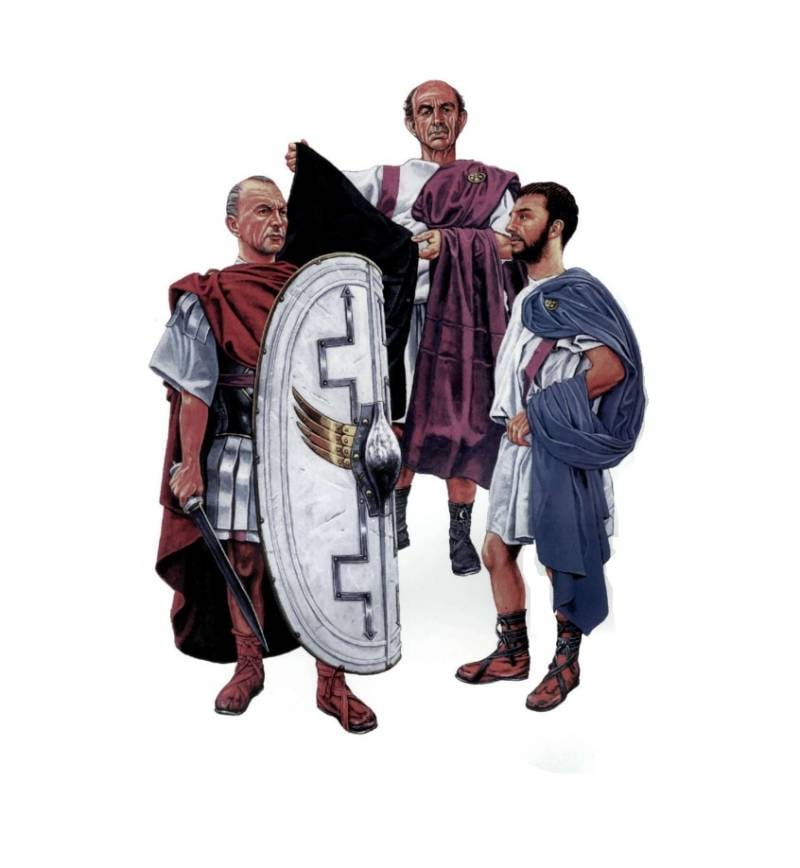
Members of the triumvirate: Julius Caesar, Mark Licinius Crassus, Gnaeus Pompey. Reconstruction. Osprey Publishing.
It was then that a triumvirate of democratic forces took shape: Caesar reconciled Crassus with Pompey and married his daughter to the latter. Both Caesar and Pompey strove for personal unlimited power, Crassus became just a buffer between the two opponents, but in the face of a common threat from the strengthened Senate, they united. So, in the elections, Caesar became consul, consul Bibulus did not play a special role.
Caesar proposed several laws aimed at correcting the situation in the republic. The first is land, more precisely, the distribution of land to veterans of Pompey in Campania and poor citizens with three or more children. The second is to approve the orders of Pompey in the East. The third is to reduce rent payments. And the last - against the extortion of governors and the protection of the provinces. Opponents of Caesar's laws were forcefully dispersed by Pompey's veterans, and they were passed during a period of heated debate in the Senate and clashes in the streets.
At the end of the consulate, Caesar received two Gauls in control.
Caesar's administration in Gaul led to the defeat of the Gallic and Germanic tribes, the establishment of the border of Rome along the Rhine. Which made him even more popular among the plebs.
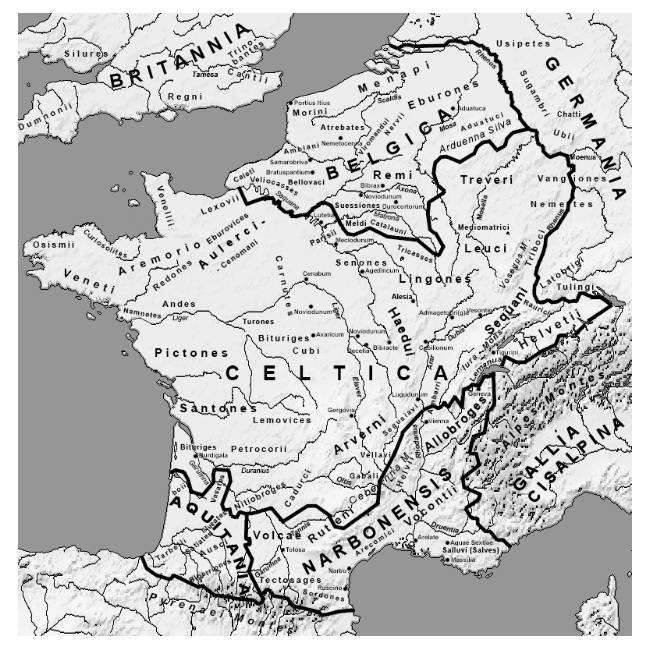
Map of Julius Caesar's zone of action.
But each of the triumvirators still needed each other, so in 56 BC. e. their meeting took place in the city of Luca in Etruria. They decided that Caesar would retain Gaul for another 5 years and that he would receive a consulate in 48. Pompey and Crassus became consuls in 55, and then received the provinces: Crassus - Syria, Pompey - the provinces of Spain.
In 53 BC. e. Crassus was defeated by the Parthians and died, while Caesar successfully fought in Gaul, made a trip to Britain and suppressed the uprising of the Gallic tribes.
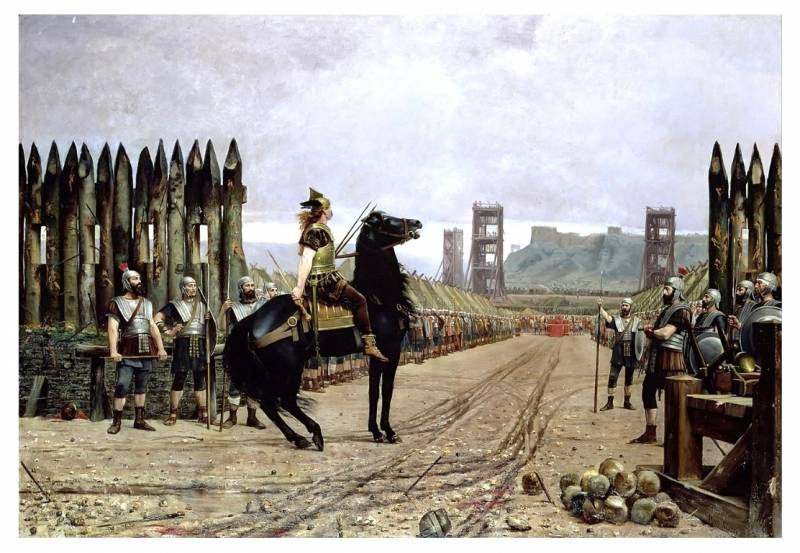
Vercingetorix surrenders to Caesar. Hood. Henri-Paul Mott. 1886.
And in Rome, the situation worsened, the elections of 53 BC. e. turned into real battles, the leaders of the crowd Milo and Clodius perpetrated atrocities and pogroms. Clodius was killed, and his funeral turned into a grand demonstration of the crowd. Under such conditions, Pompey received the right to restore order, which he carried out with the help of the army.
At the same time, after the death of his wife, Pompey, who smoothed over the friction between her father and husband, realizing the threat from the popular Caesar, went to break with him. The sluggish Pompey now went to an alliance with the Senate with its resolute leaders Cicero and Cato. Cicero called Pompey princeps, the first citizen of the republic, and in Caesar the senators saw a dictator and even a king.
If nothing changed for the senators and Pompey, then for Caesar the question was “to be or not to be”. The fact is that it was not clear what his statute would be after March 1, 49 BC. e., when his powers in Galii end and until January 1, 48 BC. when he was promised a consulship. In fact, he became a private person who could be brought to trial. Various options for a compromise between Pompey and Caesar did not pass, and Pompey behaved from a position of strength. Caesar sent a letter of conciliation to the Senate, the senators were ready to agree, but Pompey did not allow this. Caesar had no choice.
Democrat goes to monarchy
On the night of January 10-11, 49 BC. e. the military rebellion of Gaius Julius Caesar began, which finally destroyed the republic and the republican form of government. Caesar, who "cast lots", i.e., like any Roman performed a fortune-telling ceremony, led one legion with him. Under his control remained the territory, where there were a large number of veterans who had recently completed their service, and auxiliary troops in Cisalpine Gaul.
The two consuls and, of course, Pompey had much more forces. Not only did all the troops in all the provinces and along the borders of Rome in Greece, Africa, Asia, Spain obey them, in Italy there were two legions, and eight legions could be instantly assembled from veterans.
Information came to Rome only on January 14, but this did not save the situation, Caesar was moving rapidly towards Rome, and his opponents began to flee. He walked along the coast of the Adriatic Sea, gathering veterans along the way in his units. But Pompey managed to evacuate, having a fleet, from Brindisi to Dyrrachia in March 49 BC. e., while Caesar did not have time to prevent him.
Caesar did not fleet, therefore, he could not follow Pompey to the Balkans, but at the same time, having Spain in the rear with seven legions that were loyal to Pompey, he did not need it.
Caesar entered Rome, but, unlike the two previous rebels: Mary and Sulla, there was no massacre, moreover, Caesar released the prisoners and declared a policy of mercy (clementia), seeking to win Pompey's adherents to his side. His warriors behaved impeccably, no violence was allowed. Caesar himself opened the hererarium, the state treasury, and moved to Spain, laying siege to Massilia (modern Marseille) along the way.
The whole campaign lasted forty days, Caesar's opponents treated the military qualifications of the "rebel" with respect and fear, but he tried not so much to defeat the troops as to force them to surrender, which he achieved: the commanders Aphranius and Petreus, being surrounded, surrendered.
And in Rome, business life was quickly restored, even the fled senators returned. Julius Caesar was declared dictator in the city, but after a few days he withdrew this authority. He took part in the election of consul in 48 BC. e. and won together with Publius Servilius.
Historians believe that it was from this moment that the system of autocracy in Rome began, the republic went into oblivion. Of course, we can still see attempts and recurrences of returning to it in the history of Rome before the beginning of Octavian's principate, but this did not change anything.
Caesar, as in his time the first Roman rebel Sulla, seeks to give legitimacy to his activities. At the same time, as the leader of the “democratic” movement, he passed laws in favor of the poorest population and gave amnesty to his opponents.
Caesar himself moved to Greece, where, having less strength than Pompey, he was defeated by him at Dyrrhachia. And Pompey could not take advantage of this victory, while Mark Antony brought more new forces to the consul Caesar. August 9, 48 B.C. e. the Battle of Pharsalus took place (in the framework of this article, we do not have the task of describing this landmark event in world military history). The victory turned out to be on the side of the professional army, fortified by barbarian warriors, in particular, German horsemen. But the victory was very difficult:
Caesar, as consul, was declared dictator, and Mark Antony - his deputy, head of the cavalry. At the same time, Caesar received the power of a tribune, that is, complete immunity.
Pompey fled and was killed in Egypt on the very day he made his triumph in Rome after defeating Mithridates.
Now for Caesar it was not about the fight against Pompey, but with the entire Roman republican opposition, mixed with the supporters of Pompey. Caesar needed funds, and he landed in Hellenistic Egypt, where, after being besieged by the troops of Ptolemy XII Dionysus, he burned the fleet and the Library of Alexandria.
Finally, he defeated his troops, making Cleopatra, with whom he became infatuated, and her younger brother Ptolemy XIII the rulers of Egypt. After that, having defeated the son of Mithridates - Pharnaces, Caesar hurried to Rome, because as a result of the rebellion and civil war, an economic crisis hit the capital.
While the opposition Senate was operating in Utica, Cato the Younger, the leader of the republican movement, Quintus Caecilius Metella, Pompey's father-in-law, Gnaeus and Sextus, Pompey's sons, Pompey's legates from Spain, were here. All of them were supported by the Numidian king Yuba.
Antony, as Caesar's deputy, allowed complete arbitrariness in the management of the city, and suppressed unrest against his actions by force. At this time, Caesar arrives in Rome, he holds elections and goes to Campania, where he calms the rebellion of his veterans who do not want to go to Africa against the Pompeians and Republicans gathered there. Caesar introduces a deferment on the debts and rent of the "indebted" Roman plebs, thereby relieving social tension.
And again, Caesar is fighting for personal power, having landed in Africa. April 6, 46 B.C. e. his legions attacked the enemy, who was in the process of building a camp. Under such conditions, resistance was useless, the Pompeians surrendered and asked for mercy, but Caesar's veterans, exhausted by campaigns, did not listen to either them or their leader. They slaughtered the entire enemy army in the amount, according to some sources, 50 thousand people, while losing 50.
After the battle of Thapsus, Caesar received a dictatorship for 10 years. At the same time, another army of Caesar's opponents was defeated, the king of Yuba and all the leaders of the Republicans fell there, the legate Titus Labienus and Gnaeus and Sextus Pompeii, who had betrayed Caesar, fled to Spain. Numibia became a Roman province, and in the summer of 46 Caesar triumphed in Rome over Gaul, Egypt, Pontus and Numidia.
But now 13 legions had gathered in Spain, against which Caesar personally opposed with eight legions. During the battle of Munda in March 45 BC. e., the last battle of Caesar, he personally led the panicked legionnaires in the attack. The enemy was crushed at a high cost, the captured and wounded Gnaeus Pompey was executed, Sex Pompey fled and became a pirate.
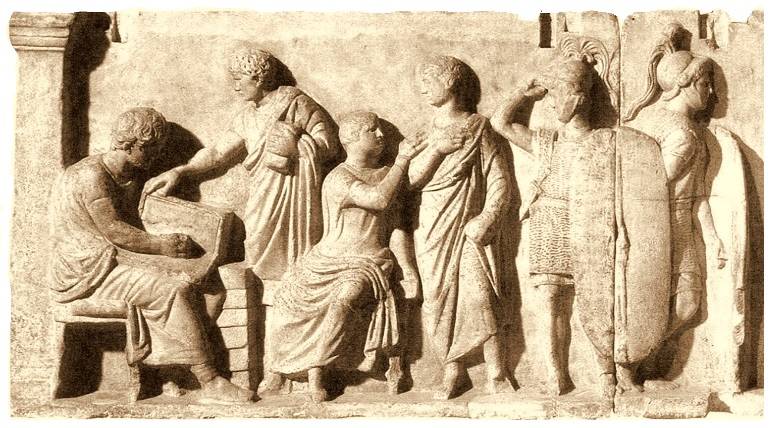
Roman soldiers. Altar of Gnaeus Domitius Ahenobarbus, opponent of Caesar and supporter of Pompey.
And Caesar now has a lifetime dictatorship from the Senate. Formally, Caesar received all the steps of the dictatorship within the framework of republican institutions. Personal enemies and republicans were completely defeated, and Caesar's personal power seemed unusually strong.
Caesar was the censor and Supreme Pontiff of Rome, he finally added the word "emperor" to his name. That is, he received all the key positions of the Roman Republic. And the term "imporium" began to denote from that time the title of the monarch or the supreme military authority in the Roman state.
So on the Roman republican legal basis, through military mutinies, the monarchical form of government of the Roman state was finally formed.
All social strata, to one degree or another, supported the establishment of a new form of government. First of all, it was, of course, the army. The plebs, which, in the course of collisions, since the beginning of the century, began to rely solely on grain distributions and support from the populace, of which Julius Caesar was a prominent representative. Business circles understood that the stabilization of the political situation and military expansion would provide enormous opportunities for enrichment.
In the course of the civil war that followed the death of Caesar, the social structure changed significantly, and the estates of patricians, plebeians and horsemen finally disappeared. The monarchy as an institution also passed through different stages of development.
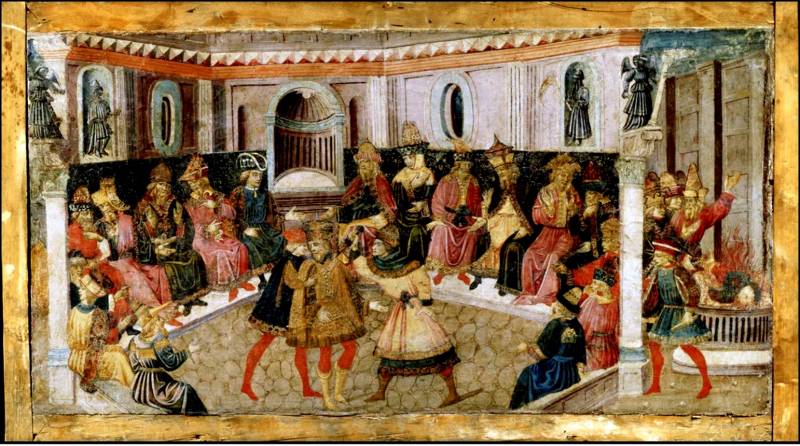
The assassination of Caesar attracted at all times, this topic became especially popular during the Renaissance. Hood. Apollonio di Giovanni di Tommaso. Pushkin Museum im. Pushkin. Moscow.
The mutiny raised by a professional army led by Sulla was a marker that showed where ancient Roman society was heading. The last rebellion in the Roman Republic put an end to that very Republic. That is, he put an end to the republican form of government, which at this historical stage could no longer cope with the tasks facing Roman society.
In subsequent Roman and Byzantine history there will be many military mutinies. But these rebellions will take place in other social conditions, when in this way a professional army will periodically hold "elections" of monarchs.
Information